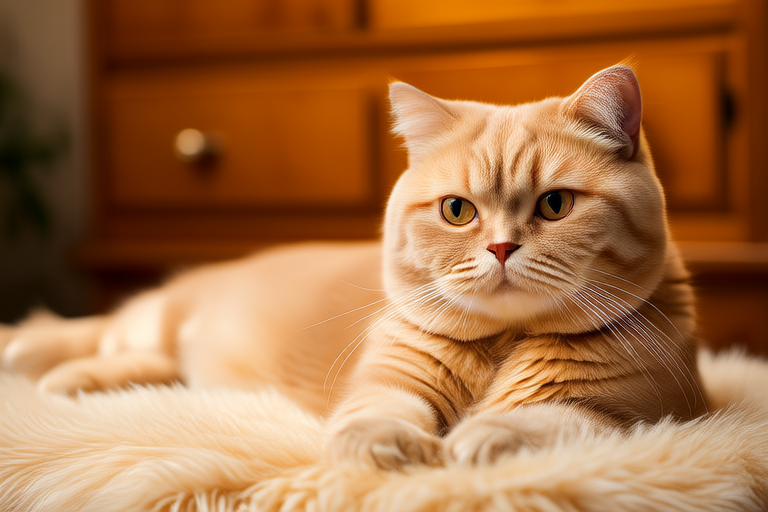Golden British Shorthairs: The Ultimate Guide to Owning a Fluffy Companion
Welcome to the wonderful world of Golden British Shorthairs! These fluffy companions have been capturing hearts for centuries with their gentle nature and striking appearance. This comprehensive guide will walk you through everything you need to know about owning one of these majestic cats, from their rich history to their dietary needs and beyond.
Breed History
The origins of the British Shorthair can be traced back to ancient Egypt, where they were revered as sacred animals. Over time, they made their way to Britain, becoming popular among aristocrats. The breed was officially recognized by the Cat Fanciers’ Association (CFA) in 1980, solidifying its place in the feline world. Golden British Shorthairs, with their unique coat color, have gained significant popularity in recent years.
Physical Characteristics
Golden British Shorthairs are known for their robust, muscular build and short, dense coats that come in various shades of gold. Their round faces, large eyes, and plush fur make them look like living teddy bears. Their average weight ranges from 9 to 18 pounds, making them medium to large-sized cats. Their thick, soft fur is water-resistant, which keeps them warm and dry during chilly weather.
Temperament
These cats are renowned for their calm and affectionate demeanor. They are generally patient, good-natured, and adapt well to different environments. Golden British Shorthairs tend to be less active than other breeds, preferring to lounge around and observe their surroundings. However, they still enjoy playtime and interactive toys. Their gentle personalities make them excellent companions for families with children and other pets.
Grooming Needs
Despite their luxurious coats, Golden British Shorthairs require minimal grooming. Regular brushing once or twice a week helps remove loose hair and prevents matting. Bathing is usually unnecessary unless absolutely needed. Keeping their nails trimmed and ears cleaned regularly ensures overall hygiene and health. A weekly dental care routine, including brushing their teeth, helps maintain oral hygiene.
Health Issues
Like all breeds, Golden British Shorthairs may be prone to certain health conditions. Hypertrophic cardiomyopathy (HCM), a heart disease, is one of the most common issues. Regular veterinary check-ups can help detect and manage this condition early. Polycystic kidney disease (PKD) is another concern, particularly in some lines. Genetic testing can identify carriers and prevent affected kittens from being born.
Dietary Requirements
A balanced diet is crucial for maintaining your cat’s health. High-quality commercial cat food, either wet or dry, provides essential nutrients. Look for products with high protein content from animal sources, such as chicken, fish, or turkey. Avoid foods containing fillers, artificial preservatives, and dyes. Fresh water should always be available. Consult your veterinarian for personalized dietary recommendations based on your cat’s age, weight, and activity level.
Training Tips
Golden British Shorthairs are intelligent and trainable. Positive reinforcement techniques, such as treats and praise, encourage good behavior. Teaching basic commands like ‘come,’ ‘sit,’ and ‘stay’ can be rewarding. Clicker training is an effective method for shaping desired behaviors. Encourage play sessions with interactive toys to stimulate mental and physical exercise. Providing scratching posts and climbing structures satisfies their natural instincts.
Integrating into a Family
Bringing a Golden British Shorthair into your home requires careful planning. Introduce new pets gradually to ensure compatibility. Children should be taught how to handle the cat gently. Create a safe space with hiding spots and perches for your cat to feel secure. Establish routines for feeding, playtime, and grooming to provide structure and comfort. Patience and consistency are key during the adjustment period.
Anecdote: Meet Whiskers
Whiskers, a Golden British Shorthair, joined our family last year. Initially shy, he now greets us at the door with purrs and headbutts. His playful yet laid-back personality makes him perfect for our busy household. We’ve noticed that he loves chasing laser pointers and curling up in cozy blankets. Our bond has grown stronger through daily interactions and shared moments.
Practical Ownership Tips
- Spay or neuter: This procedure promotes better health and behavior while preventing unwanted litters.
- Regular vet visits: Annual check-ups help catch potential health issues early.
- Safe environment: Ensure your home is free from hazards like toxic plants, small objects, and open windows.
- Toys and enrichment: Provide stimulating toys to keep your cat mentally and physically engaged.
- Quality time: Spend quality time with your cat daily to strengthen your bond.
Conclusion
Owning a Golden British Shorthair is a rewarding experience filled with love and companionship. By understanding their breed-specific traits and providing proper care, you can ensure a happy and healthy life for your fluffy companion. Remember, each cat is unique, so tailor your approach to meet their individual needs. With patience, dedication, and love, you’ll create lasting memories together.
